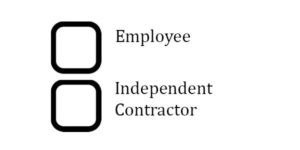Before classifying a worker as an independent contractor, it is important for a business owner to do his or her homework carefully. Employment laws today are very strict, so discuss any concerns with an agent.
The United States Department of Labor and the Internal Revenue Service have combined their efforts to help various states share resources and information that will expose worker classification violations. Employers found to be in violation could face paying back taxes, back pay to workers, missed overtime, retroactive benefits, interest, fines, staff effort charges and legal fees. With situations where there are multiple violations or willful negative intent, the penalties and fines are worse. In addition to the money a violation would cost, employers would also face the negative effects of this damaging information being made available to the public.
 The IRS has made it clear that it is not easy to classify independent contractors and employees. Every case they evaluate is different based on a wide variety of factors. To start, employers may think about whether they have control over a worker’s performance and work outcomes. This is not based on whether an employer decides to exercise control. It is a matter of whether the employer actually has the legal ability to control the workers in these areas. The IRS has a set of rules called the Common Law Rules, which cover the categories of financial control, behavioral control and relationship classifications. None of these factors are individually decisive. The entire situation must be evaluated to make an accurate determination. In addition to these evaluations, employers may take the Economic Reality test from the Department of Labor. This test is based on the Fair Labor Standards Act and includes six factors that are similar to those used by the IRS.
The IRS has made it clear that it is not easy to classify independent contractors and employees. Every case they evaluate is different based on a wide variety of factors. To start, employers may think about whether they have control over a worker’s performance and work outcomes. This is not based on whether an employer decides to exercise control. It is a matter of whether the employer actually has the legal ability to control the workers in these areas. The IRS has a set of rules called the Common Law Rules, which cover the categories of financial control, behavioral control and relationship classifications. None of these factors are individually decisive. The entire situation must be evaluated to make an accurate determination. In addition to these evaluations, employers may take the Economic Reality test from the Department of Labor. This test is based on the Fair Labor Standards Act and includes six factors that are similar to those used by the IRS.
One of the best ways to show that a worker is not an employee but an independent contractor is to show proof of that individual’s ownership of a business. In addition to this, employers can show proof that the worker’s tasks are not an integral part of the employer’s business. Workers who are free to be hired by others or who perform freelance work are not considered employees. For every independent contractor used, businesses should keep vendor folders on file. The following paragraphs outline what information should be included in each file.
W-9 Form
Every independent contractor should complete a W-9. This is necessary for creating a 1099 tax document. If the individual does not claim exemption, employers should withhold taxes. For current tax withholding percentage information, discuss the topic with an agent. However, independent contractors should be encouraged to check the box and file their own self-employment taxes.
Invoices
Keep every invoice the contractor submits. Payment should be made based on these documents. If a worker is not an employee, he or she should not submit expense reports. Since mileage and equipment are a contractor’s business expenses, contractors should not bill for these items. Make sure all invoices match 1099 forms, which must be sent to the independent contractor after the end of the year.
Proof Of Separate Business
If an independent contractor has his or her own business, keep any items that reflect proof of this. Business stationery, advertisements, brochures, business cards or any similar items are acceptable. For contractors who have their own sites on the Internet, it is important to print copies of any online pages where services are outlined.
Written Contracts
It is important to have a written contract for every independent worker. This document should clearly state the nature of the relationship between the business and the worker. In addition to this, the project’s details should be outlined. A contract should include what the business expects from the contractor, the payment terms and any deadlines. Make sure the document is dated and signed by both parties. If a contractor has a tax identification number, this should be included. New contracts should be created for each project when the same contractor is hired for multiple projects.
About The Andrew Agency
The Andrew Agency, an independent insurance broker, serves clients in Virginia, Maryland and D.C. If you have questions about Workers Compensation, General Liability, Certificates of Insurance or any other insurance related matter, contact us at 804.320.2886 or [email protected].










